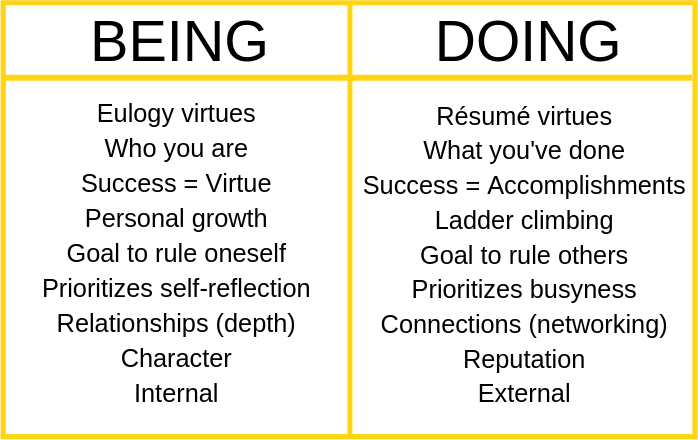Being > Doing
I think many of us are trapped on a hamster wheel of hyperactivity.
We simply cannot stand still.
Every empty moment in line at Starbucks is a chance to catch up on emails.
Every bus ride is a time to scroll our Instagram feed or read Facebook updates.
Every second of silence begs to be filled with music, podcasts, etc.
We fill every waking moment with productivity, entertainment, and self-gratification. We are defined by constant activity.
This obsession with hyperactivity permeates every aspect of our lives and is especially evident in the way we approach our work.
Our Hyperactivity Hurts Us, But Benefits Businesses
Remarkably, we even had to invent a new phrase to describe our society’s penchant for working long hours. Alexis Ohanian, co-founder of Reddit, coined the phrase “hustle porn” to describe our preoccupation with work.
“This idea that unless you are suffering, grinding, working every hour of every day, you’re not working hard enough… this is one of the most toxic, dangerous things in tech right now. It’s such bullshit, such utter bullshit. It has deleterious effects not just on your business but on your wellbeing.” -Alexis Ohanian
During the day, we work unnecessarily long hours to climb a corporate ladder. Companies pay hourly employees for 40 hours per week, yet demand higher productivity than can be fit into 40 hours, which encourages employees to work off-the-clock to satisfy demands. Salaried employees are paid the same paycheck every month, yet they’re subtly encouraged to put in 50, 60, or even 70 hours per week just to keep up.
“From the inside, a hamster wheel looks like a career ladder.” -Anonymous
During the night, rather than experiencing true relaxation through meditation, prayer, long walks, or solitude, our hyperactivity pushes us toward our computers, televisions, and phones. Within each of these platforms, our hyperactivity is monetized. Every click, advert, and scroll is sold to the highest bidder. We are the product.
Both day and night, our relentless hyperactivity has generated billions of dollars for Corporate America while leaving us suffering from quarter-life crises, dopamine withdrawals, and fake relationships.
It has gotten to the point that we actually fear silence and solitude. We feel the need to fill every empty space of our lives with activity, distraction, and entertainment — if only to block out our own thoughts.
We are empty vessels of activity — constantly DOING but not truly living.
Résumé Virtues vs. Eulogy Virtues
Journalist David Brooks, author of The Road to Character, explains that we are obsessed with “résumé virtues,” yet we often neglect to develop “eulogy virtues”:
“It occurred to me that there were two sets of virtues, the résumé virtues and the eulogy virtues. The résumé virtues are the skills you bring to the marketplace. The eulogy virtues are the ones that are talked about at your funeral — whether you were kind, brave, honest or faithful. Were you capable of deep love?
We all know that the eulogy virtues are more important than the résumé ones. But our culture and our educational systems spend more time teaching the skills and strategies you need for career success than the qualities you need to radiate that sort of inner light. Many of us are clearer on how to build an external career than on how to build inner character.”
I completely agree with Brooks. We often forget what is most important in life (character, virtue, family, etc.), so we instead focus upon what will get us ahead in our careers.
Our careers are defined by how fast we’re climbing the corporate ladder.
Our popularity is defined by how full the little boxes are on our calendars.
Our relationships are defined not by their depth but by their usefulness.
Our success is defined by the car in our driveway and the dollars in our bank.
BEING vs. DOING
But I think the problem goes deeper than just our résumés and careers. We have a pernicious addiction to hyperactivity in all its forms.
I would state the point a little differently than Brooks: we are focused on DOING — not on BEING.
You may be wondering, “What the heck is BEING?”
When I talk about BEING, I’m talking about a mindset of developing character and virtue rather than focusing on dollars, career accomplishments, and entertainment.
Individuals who exhibit a BEING mindset are willing to put in the difficult work to refine themselves as people.
It can be uncomfortable to think about BEING because it is a theoretical, hard-to-define concept, so let’s make this concept more practical.
Hop into your mental time machine and travel back to middle school English class. Do you remember when you first learned about “state of being” verbs?
As a quick refresher, ThoughtCo defines a state of being verb as “a verb that does not show action…In other words, a state-of-being verb identifies who or what a noun is, was, or will be.”
I remember being confused about how a verb could describe something that just was. It sounded incredibly boring. In my mind, the best verbs conveyed some form of action: running, jumping, winning, earning, etc. Did your middle school self feel the same way?
My juvenile preference for action verbs aligns closely with how our society views BEING versus DOING. DOING seems much more productive and worthwhile, so we throw ourselves headfirst into hyperactivity in order to outdo everyone else.
Here are a few differences between the BEING and DOING mindsets:

In short, BEING focuses on the inside, whereas DOING focuses on the outside.
The problem with our DOING/hustle porn/hyperactivity mindset is that true self-worth and success come from internal virtues rather than external activity.
Our pursuit of nonstop entertainment and productivity has drowned out our ability to develop real relationships and purpose. We’re focused on getting ahead rather than becoming men and women of substance and depth.
What Would It Look Like for Us to Focus on BEING?
It is in moments of silence — not activity — that we develop character.
We must cultivate inner silence in order to listen to the subtle personal voice that will expose our personal vices and flaws.
“We live in a society that encourages us to think about how to have a great career but leaves many of us inarticulate about how to cultivate the inner life…
The noise of fast and shallow communications makes it harder to hear the quieter sounds that emanate from the depths. We live in a culture that teaches us to promote and advertise ourselves and to master the skills required for success, but that gives little encouragement to humility, sympathy, and honest self-confrontation, which are necessary for building character.” -David Brooks
Here are six examples of what it looks like to develop the BEING mindset:
(1) Recognize that every action shapes you
“Your beliefs become your thoughts,
Your thoughts become your words,
Your words become your actions,
Your actions become your habits,
Your habits become your values,
Your values become your destiny.”
-Gandhi
We are often unaware that every action we take is developing us into the person we will be tomorrow.
Whether we spend today watching tv or reading a book will profoundly affect our future — not in a direct, noticeable way but in an indirect, subtle one.
People who exhibit a BEING mindset still value action and productivity. DOING is still important. It is just a question of what we choose to do.
Every action is not created equally.
“It’s not at all that we have too short a time to live, but that we squander a great deal of it. Life is long enough, and it’s given in sufficient measure to do many great things if we spend it well…And so it is — we don’t receive a short life, we make it so.” -Seneca
(2) Stop wearing busyness as a badge of honor
“Being busy is a form of laziness — lazy thinking and indiscriminate action.” -Tim Ferriss
A few years ago, I realized that I had fallen into the busyness trap. Every time someone asked how I was, I offered the same glib response: “I’ve been super busy, but things are going well.”
It felt good to say that I was busy. It was code for “People need me. I’m important.”
For some ridiculous reason, our culture equates full schedules with importance. We think that if we are busy, others will see how hard we’re working and think we’re successful.
The problem is that having a full schedule doesn’t mean a dang thing for our growth, development, and character.
Those with a DOING mindset focus on filling their schedule, while those with a BEING mindset focus on whether their actions reconcile with who they’re trying to become.
I’m not advocating that we shouldn’t work hard and try to be productive. I just think we need to question whether we’re working on the right things. Henry David Thoreau said it best: “It is not enough to be busy. So are the ants. The question is: What are we busy about?”
(3) Take time to self-reflect
“Self-reflection is the quality that most differentiates those who evolve quickly from those who don’t. Remember: Pain + Reflection = Progress.” -Ray Dalio
Self-reflection is difficult because it requires us to slow down long enough to critique ourselves. We must suspend action in order to evaluate action.
Individuals who excel at self-reflection ask themselves deep questions — questions that interrogate reality and demand a verdict. Listen for the differences between these shallow questions vs. deep questions.
- What can I do to earn a promotion? → How can I become someone worth following?
- What can I do to get that person to like me? → What do I dislike about myself? Am I comfortable with who I am today?
Such reflection helps us determine whether we’re meeting our own expectations and identify what we want to improve within ourselves.
Reflection can take many forms. It can be as simple as spending five minutes at the end of the day or week to write down a few accomplishments and a few things you wish you had done differently. The key is to not only reflect on your actions (DOING) but also what they say about you as a person (BEING).
For instance, I have a weekly self-reflection process that takes roughly five minutes every Friday. I write a personal retrospective for the week on a 3x5 card, stating the things I accomplished while simultaneously acknowledging where I struggled throughout the week. For any goals I didn’t complete, I write what caused me to miss the goal.
A few weeks ago I failed to finish a writing project. Rather than chalking up my missed goal to busyness or uncontrollable factors, I realized that the true reason I didn’t complete the task was that I had been lazy and failed to prioritize effectively. My 3x5 notecard for that week includes this line: “Sure, it was a busy week, but my failure to finish this chapter shows that completing the task was not truly a priority to me. Why? I’m scared to work on it because it’s hard, I’m not sure how good it is, and I didn’t make the time to work on it.”
Genuine reflection means diving below the surface-level (DOING). You must identify what character or personality trait within you (BEING) prompted the behavior you exhibited.
(4) Prioritize solitary habits like meditation, walks, and solo retreats
“External things can’t fix internal issues.” -Ryan Holiday and Stephen Hanselman
One of the best ways to encourage self-reflection is to schedule solitude in your life.
Only when the body is quiet can the spirit speak. Our challenge is to cultivate times of silence amidst the craziness of everyday life.
I’ve begun to schedule an annual solo retreat to ensure I make time for solitude and reflection. A solo retreat is a chance to get away from the normal stresses of life, technology, and work to spend time alone thinking about what is most important to you. I use my retreat to think, read, write, pray, and take long walks.
There are always a million reasons not to go on a retreat like this (too busy, too expensive, no babysitter, etc.), but the investment is always worth the cost. I’ve gone on a couple of these retreats now, and I’ve found them to be refreshing and life-giving.
(5) Make time for what is most important
“We’re tight-fisted with property and money, yet think too little of wasting time, the one thing about which we should all be the toughest misers.” -Seneca
Financially savvy people use budgets to track where they’re spending their money. Such budgets are effective because they highlight two key things:
- Where you’re spending discretionary funds (e.g. $5 on coffee every day, $100 per month on cable television)
- Which financial goals you want to achieve (e.g. retiring at age 65, taking an international vacation, buying a new car)
Many of us utilize financial budgets, but we don’t apply the same budgeting mindset to how we spend our time.
Conduct a time audit next week. Determine where you’re spending discretionary time and whether you’re achieving your personal goals.
Does your time reconcile with your passions and ambitions?
If you’ve always wanted to write a book, does your schedule reconcile to that goal? If you want to be a great spouse, do you prioritize date nights with your partner? If you want to be a loving mother or father, do you take time to play Legos or Monopoly with your daughter?
(6) Emphasize growth rather than titles
“The final estimate of men shows that history cares not an iota for the rank or title a man has borne, or the office he has held, but only the quality of his deeds and the character of his mind and heart.” -Samuel Brengle
I don’t know about you, but I’d rather be a respected servant than a disrespected dictator. Our world places an enormous emphasis on titles, but a fancy title means nothing if you are morally bankrupt.
From the perspective of the BEING mindset, the primary benefit conveyed by a higher office is that you have a larger platform from which to impact others.
The role itself doesn’t matter. You could be a janitor, a financial analyst, or a CEO. You can lead from your role by being kind, honest, and trustworthy.
Focus on personal growth rather than ladder-climbing. By doing so, you will develop the knowledge, character, and resilience to become a person of influence, regardless of where you are in the organizational hierarchy.
I’ve been dwelling on this BEING vs. DOING concept for a while, and I’m convinced that who we are matters far more than what we do.
I’m still trying to learn how to live the BEING mindset. I don’t have many answers, but I have a direction. My personal compass is now pointed toward trying to become a person of character rather than hyperactivity.
Where is your compass pointed?






